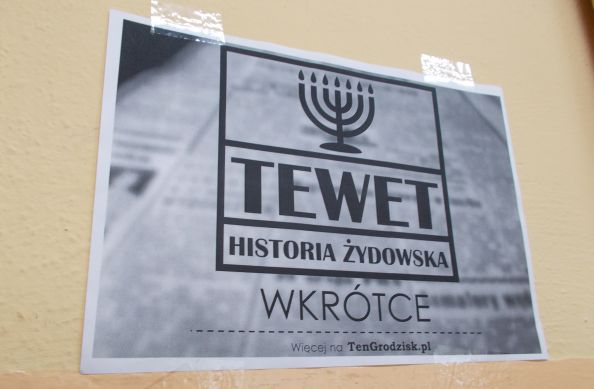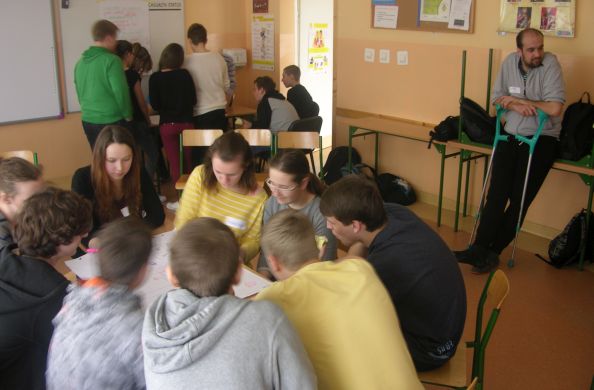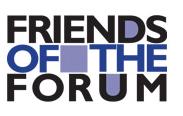| 2015 |
Grodzisk Mazowiecki
Polish Noble Laureates Junior High School No 1


| 2015 |
Honorable Mention at 2015 School of Dialogue Gala
23 fencing spans painted, 28 days spent on cleaning the cemetery. Parents, firemen and local authorities all involved in. Junior high school students made the whole community of the town engaged in renovation of the Jewish cemetery in Grodzisk. “I am a resident of Grodzisk and I feel obliged to do something good for the future, thanks to the past. I found the history of the Jewish cemetery the most interesting. My group tries to give a new life to this place, to renovate it”, said one of the participant in the School of Dialogue workshops.
The school provided the paint and tools, the firemen poured water on the plaster walls, the town authorities put an information plaque there, written in three languages. Renovation of the Jewish cemetery was just a part of the students’ project in the framework of the School of Dialogue program. In the junior high school, Forum educators led four workshops about the Jewish culture, religion and history in the pre-war Grodzisk.
Jews had lived in Grodzisk from the 14th century. In the 19th century the Jewish community flourished in the town – Jews made up 90% of the town’s population, and Grodzisk was called a “Jewish town”. At the end of 1939, 3255 Jews lived in town (acc. 20% of the town’s population). On December 1, 1940, Germans set up a ghetto. It was liquidated in February 1941, and about 6 000 Jews that had stayed in the ghetto were transported to the one in Warsaw. After, they were deported to the death camp in Treblinka. “While tracing the footsteps, searching for the history witnesses and places connected to the Jewish community, I was at the same time curious and very sad because the Jews of Grodzisk are no longer part of our community. There is this huge void left and we are trying to fill it in – we want to bring back the memory of Jews from Grodzisk”, said Ola, one of the participants in the School of Dialogue workshops.


Students from Grodzisk decided to take primary school students on a walking tour in the footsteps of Jews from Grodzisk in order to pass knowledge about the Jewish community. The well-prepared educational tour, adapted to the age of the students, took place on June 3. The walking tour including elements of an urban game, let through the Jewish cemetery, the train station and the old Jewish buildings. The students told their younger school friends about the non-existing places, such as the synagogue, slaughterhouse and the ghetto. They showed them traces of mezuzah and sukkah. The next stage of the project involved workshops organized for their fellow junior high students, during which they shared knowledge from the workshops.
Apart from the actions undertaken at the cemetery, the walking tour for the students of primary school as well as the workshops for junior high students, two teams of students were producing films.
The first group created a film “Locked cemeteries” which depicts the development of the entire project. The second team managed to contact Mrs. Halina Rubin, a daughter of Jews from Grodzisk, and they interviewed several town residents. The memories of Mrs. Barbara Macher and Mr. Roman Sławiński about the Jewish life in Grodzisk were filmed and translated into English. The film also shows some interesting old photos of the town. The deputy mayor, Tomasz Krupski, did the voice over. “The month of December, that is Tewet, was considered the end chapter of the long-time presence of Jews in Grodzisk. The wind covered the traces. When the Jewish residents disappeared from Grodzisk and the market square started to slowly regain life, overshadowed by the war, some shops and workshops appeared again to fill the void in the town (…) Today, when discovering these stories, we learn about those residents who are gone – we owe them a moment of reverie and a duty to never forget”, he said in the film Tewet.

School:
Polish Noble Laureates Junior High School No 1
Honorable Mention:
Honorable Mention at 2015 School of Dialogue Gala
Students:
3rd year students and school history club
Teacher:
Małgorzata Soczewicz
Expert:
Tomasz Krupski
Educators:
Karolina Jastrzębska-Mitzner, Stanisław Niemojewski
In appreciation to the Conference on Jewish Material Claims Against Germany (Claims Conference) for supporting this educational program. Through recovering the assets of the victims of the Holocaust, the Claims Conference enables organizations around the world to provide education about the Shoah and to preserve the memory of those who perished.

Program co-financed from the funds granted by Citizens for Democracy program, financed through the EEA grants.

In appreciation to Friends of the Forum for supporting the School of Dialogue educational program.
